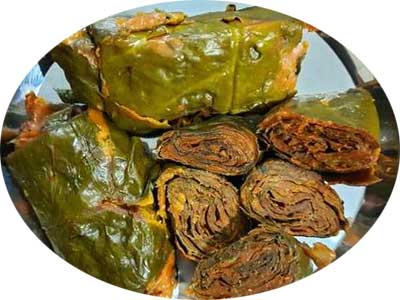Patrode, a traditional colocasia leaf roll delicacy of India, has been chosen as a traditional food recipe by the Ministry of Ayush.
The Ministry of Ayush has released a booklet recently on “Traditional Food Recipes” from the AYUSH System of Medicine for an Ayushman Bharat. The booklet has been designed to create awareness in the community about the tradition-based AYUSH food recipes. It not only helps in recovery from the disease but, also helps in the prevention of many disease conditions.
PM Narendra Modi while releasing the commemorative postal stamps and distribution of Yoga Awards on August 30, 2019, had also advocated encouraging traditional food recipes to make it a part of the food habits of people.
The booklet comprises recipes that have medicinal and health values from all over India. There are 26 recipes mentioned in the booklet, including amalaki panaka, amla squash, takra, khalam, yusha, rasala, kharjuradi mantha, peya, ragi and banana smoothie, kulattha rasam, and more. It also includes recipes for lactating mothers.
One of them is Patrode, colocasia leaf rolls. It is a delicacy made of colocasia leaf. This traditional recipe is highly popular in the south of India and can either be served as fried rolls with chutneys or in the form of a curry. Patrode is easily digestible too.
Colocasia is a genus of flowering plants in the family Araceae. They are native to southeastern Asia and the Indian subcontinent. The large colocasia leaves, also known as elephant ear plants are rich in dietary fibers which helps in easy bowel movement. They are also rich in iron, which helps in improving the hemoglobin level in the human body.
Colocasia leaves contain phenols, tannins, flavonoids, glycosides, and sterols. These substances aid in reducing chronic inflammation such as rheumatoid arthritis. The leaves have significant amounts of vitamin C and beta carotene too.
Apart from nutritional value, the colocasia leaves are also used for art purposes.
Both are roots and leaves of colocasia are consumed in various parts of India. The root is also commonly known as ‘arbi’. Colocasia leaves are highly popular in Malnad, coastal Karnataka. Additionally, it is also consumed in Bihar where it is also known as airkanchan, Gujarat, parts of Uttar Pradesh, Manipur, Kerala, Maharashtra, Nagaland, Bengal, and other states in India.










Related Items
Coffee could hold the secret to spotting deadly dyes in food
Indusfood 2025: A global showcase of Indian Food Economy
Green views lead to healthier food choices, says study